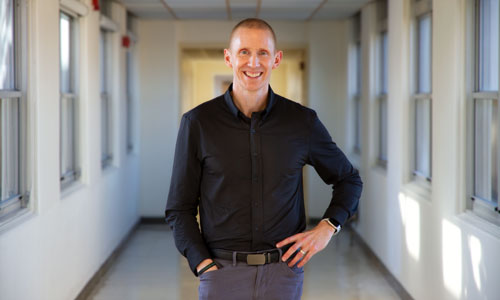Dr. Jordan Williams receives $400K to Advance Spinal Cord Injury Research
Aug 25, 2025
 Dr. Jordan Williams, Assistant Professor in the Marquette–MCW Joint Department of Biomedical Engineering and director of the Neural Engineering & Modulation Laboratory, has been awarded a $400,000, two-year research grant through the Spinal Cord Injury Research on the Translational Spectrum program of the Craig H. Neilsen Foundation. Dr. Williams’ project, “Functional Motor Recovery After Spinal Cord Injury Using Viral-Mediated Optogenetic Stimulation”, addresses one of the greatest challenges in spinal cord injury research: restoring precise movement after long-term or permanent paralysis.
Dr. Jordan Williams, Assistant Professor in the Marquette–MCW Joint Department of Biomedical Engineering and director of the Neural Engineering & Modulation Laboratory, has been awarded a $400,000, two-year research grant through the Spinal Cord Injury Research on the Translational Spectrum program of the Craig H. Neilsen Foundation. Dr. Williams’ project, “Functional Motor Recovery After Spinal Cord Injury Using Viral-Mediated Optogenetic Stimulation”, addresses one of the greatest challenges in spinal cord injury research: restoring precise movement after long-term or permanent paralysis.
Current approaches to restoring motor function after spinal cord injury include functional electrical stimulation of nerves and muscles or epidural spinal cord stimulation. These treatments have shown promise in restoring some gross movement functions, but typically recruit muscle fibers in an unnatural order and can cause rapid muscle fatigue. In addition, the treatments are not specific enough to affect precise motor control, such as that needed to command fine movement of the fingers and toes. A newly emerging approach, called optogenetic nerve stimulation, uses injection of a viral gene therapy that allows light to activate the nerves controlling injected muscle groups. This technique has shown promising results in healthy animal subjects by enabling more natural recruitment and precise control of specific muscles. This increased level of precision reduces fatigue and improves dexterity; however, the therapy has not been fully studied in cases of chronic spinal cord injury, where long-term deficit may cause physiological changes to muscle and nerve tissue that could affect the initial gene therapy uptake delivery to targeted nerves.
Building on previous in-house advancements in viral optogenetic expression, a process whereby intramuscular viral injections facilitate the labeling of specific neurons, this project will evaluate the potential use of optogenetic stimulation as a tool in the treatment of chronic paralysis by measuring the accuracy of muscle activation, resistance to fatigue, and response to different stimulation patterns. Dr. Williams and his team will also refine their method of using viral mediation to target specific nerve types, depending on the desired outcome, as well as its ability to functionally restore paralyzed reaching movements in animals with spinal cord injury. Ultimately, this research is a critical next step in solving the problem of chronic paralysis—and developing a better understanding of the potential therapeutic applications of this exciting new technology.
Learn more about Dr. Jordan Williams
Learn more about the NEMo Lab
Led by Dr. Jordan Williams, The NEMo Lab at the Marquette-MCW Joint Department of Biomedical Engineering engages students of all levels in conducting innovative research in optogenetics, gene therapy, and brain-computer interfaces, focusing on restoring motor function and advancing neural control technologies through integrated experimental and computational approaches.
Learn more about the NEMo Lab

 Dr.
Dr. 